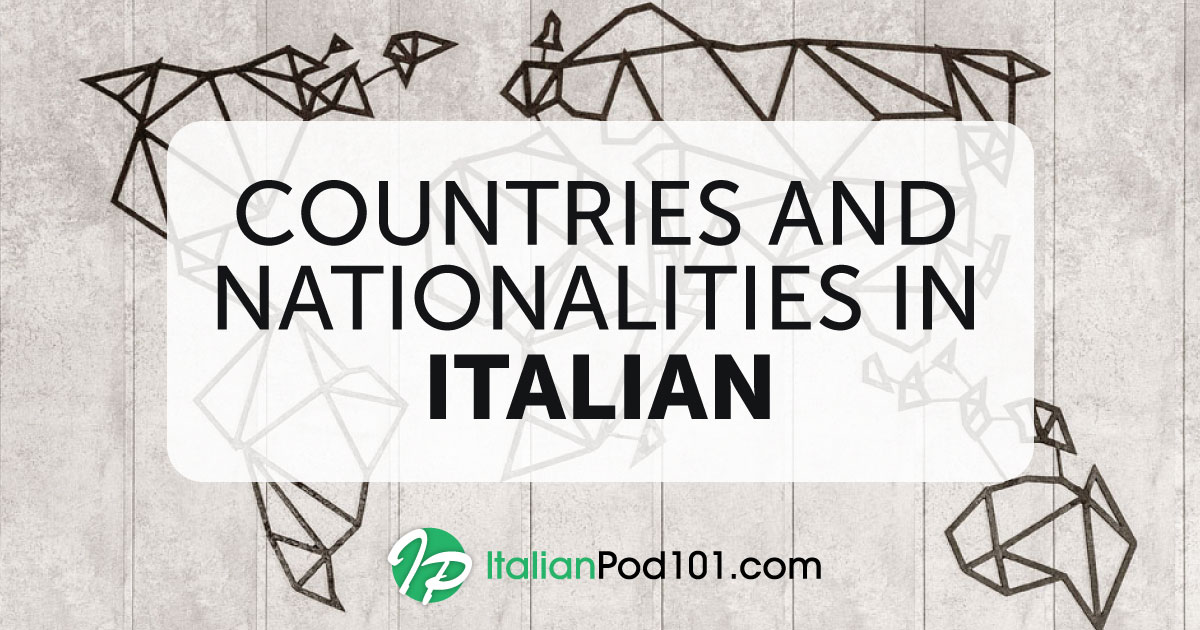
Are you just starting out with Italian? In this guide, you’ll find all the Italian phrases for beginners that you will need in order to meet and greet people, get around cities and regions, ask for directions, and even order food or go shopping. All the basic sentences to get you going in your first Italian conversations!
 Table of Contents
Table of Contents
- Greetings and Self-introductions
- Courtesy Phrases & Social Expressions
- Dining
- Shopping Phrases
- Asking for Help
- Conclusion
1. Greetings and Self-introductions
Hello. Good morning. How are you? Nice to meet you.
The first thing to know is that, in Italian, we have two ways of addressing people: with formal speech and with informal speech. Habits are slowly changing, and informality is becoming increasingly common and accepted in contexts where it previously would have been unheard of (in the workplace, between people of different age groups, etc.).
Especially in the case of new Italian learners, using informal speech is completely acceptable. But here, we have included phrases for both formality levels.

L’italiano è facile! (“Italian is easy!”)
Let’s start with some basic Italian phrases that you could use when meeting people in Italy.
| Ciao. [Casual] |
| Hi. / Bye. |
| The word ciao is the most common greeting in the Italian language for friendly and informal encounters. You can use it when first meeting someone and when saying goodbye; you can also use it when addressing either one person or a group of people. The word is of Latin origin, and it was once used primarily in Northern Italy, though it is now used internationally. |
| Salve. [Formal or casual] |
| Hello. |
| Literally: “Health to you.” This is another common Italian word derived from Latin. It is considered neutral, and it can be used in both formal and casual contexts. |
| Buongiorno. [Formal or casual] |
| Hello. |
| Literally: “Good day.” |
| Buonasera. [Formal or casual] |
| Good evening. |
| So, what time of day do we start saying buonasera? It might vary from region to region, but typically it’s correct to greet with buonasera when it starts getting dark. Obvious, right? |
Now that you’ve greeted everyone, it’s time for some polite questions and answers:
| Come va? [Formal or casual] |
| How is it going? |
| Come stai? [Casual] | Come sta? [Formal] |
| How are you? | |
| Tutto bene. [Casual] | Bene, grazie, e lei? [Formal] |
| All good. | Fine, thanks, and you? |
Once you’ve gone over the basic greetings, you’ll want to find out a bit more about the people you’re meeting. This is the perfect time to start asking and answering more personal questions.
| Come ti chiami? [Casual] | Come si chiama? [Formal] |
| What’s your name? | |
| Literally: “How do you call yourself?” | |
| Mi chiamo Maria. |
| My name is Maria. |
| Literally: “I call myself Maria.” |
| Piacere. [Formal or casual] |
| Nice to meet you. |
| Literally: “Pleasure.” |
| Di dove sei? [Casual] | Di dov’è? [Formal] |
| Where are you from? | |
| Sono Italiano/a. |
| I’m Italian. |
| Sono di Roma. |
| I am from Rome. |
| Abito a Roma. |
| I live in Rome. |
| Quanti anni hai? [Casual] | Quanti anni ha? [Formal] |
| How old are you? | |
| Literally: “How many years do you have?” | |
| Ho 27 anni. |
| I’m 27 years old. |
| Literally: “I have 27 years.” |
Are you ready for some in-depth practice? We recommend checking out our video lessons on how to say hello and how to introduce yourself in Italian.

Piacere, mi chiamo Maria. (“Nice to meet you; I am Maria.”)
2. Courtesy Phrases & Social Expressions
Grazie! Nothing expresses courtesy, pleasantry, and kindness better than this word—also of Latin origin—which literally means “graces.”
Why is it important to master courtesy phrases and expressions? Because they help you navigate new environments, elicit sympathy from other people, and make it easier to communicate with others.
Below are several simple Italian phrases for beginners that will help you put your best foot forward in any situation.
| Grazie. |
| Thank you. |
| Literally: “Graces.” Despite being the most basic Italian word, grazie can be a bit tricky to pronounce, especially the final -zie. Here is a little phonetic help for you: Pronounce this word as if it were written graTSeeAY. If the phonetic transcription looks strange, just listen to the audio recording… 😉 |
| Prego. |
| You’re welcome. |
| Literally: “I pray.” You can also express this concept using one of these phrases: Di nulla. / Di niente. Literally: “Of nothing.” |
| Scusa. / Scusami. [Casual] | Scusi. / Mi scusi. [Formal] |
| Excuse me. / I am sorry. | |
| This word works both for apologizing and for catching someone’s attention before asking a question. For example: Scusa, mi puoi dire dov’è la stazione? (“Excuse me, can you tell me where the station is?”) | |
| Per favore. / Per piacere. [Casual or formal] |
| Please. |
| Literally: “As a favor.” / “As a pleasure.” |
- → Would you like to improve your social grace? ItalianPod101 has plenty of resources to help you out. We recommend our lesson on how to say “you’re welcome” in Italian and our article on Italian customs and etiquette.

Mi dispiace… (“I’m sorry…”)
Another way to apologize:
| Mi dispiace. |
| Sorry. |
| Literally: “It displeases me.” |
| Non c’è problema. |
| That’s okay. |
| Literally: “There is no problem.” This is a good way to end the forgiveness topic. Better to forget and move on. But if this still isn’t enough, check out our guide on how to say sorry in Italian. |
And now, it’s time to say goodbye!
| Arrivederci. [Casual] | Arrivederla. [Formal] |
| Goodbye. | |
| Literally: “Let’s see ourselves again.” Remember that you can also use the ever-useful ciao when you’re leaving an informal setting. | |
| Buonanotte. [Formal or casual] |
| Goodnight. |
| Buonanotte is generally the departure phrase we use at the very end of the day. Basically, right before we go to sleep. Would you like to serenade your Italian with a nice romantic lullaby? Here’s Buonanotte fiorellino (“Goodnight, Little Flower”) for you. |
| A più tardi. | A dopo! |
| See you later. | See you! |
| Literally: “Until later.” | Literally: “Until after.” |
| A presto. |
| See you soon. |
| A domani. |
| See you tomorrow. |
| Buona fortuna. |
| Good luck. |
3. Dining
Whether you’re studying Italian or just traveling around, at some point you’ll find yourself sitting down in a restaurant or a trattoria. When this happens, you’ll get the best experience if you know a few basic Italian phrases for ordering food, getting your waiter’s attention, and more.

Ho fame…! (“I’m hungry…!”)
| Andiamo a pranzo? |
| Shall we go to lunch? |
| Andiamo a cena? |
| Shall we go to dinner? |
| Ho fame. |
| I’m hungry. |
| Literally: “I have hunger.” |
| Posso vedere il menù? |
| Can I see the menu? |
| Qual è il piatto del giorno? |
| What is today’s special? |
| Literally: “What is the dish of the day?” |
| C’è un menu turistico? |
| Is there a tourist menu? |
| Per me una pizza margherita e una birra, grazie. |
| I would like a pizza margherita and a beer, thanks. |
| Probably the most renowned type of pizza, it’s very simple and traditional with an interesting story behind it. |
| Da asporto / Da portare via |
| To go |
| Literally: “To remove” / “To take away” |
| Il conto, per favore. |
| The bill, please. |
- → Do you need more Italian vocabulary and phrases for the restaurant? Check out our vocabulary list with recorded examples to practice your pronunciation!
4. Shopping Phrases
What fun is traveling if you don’t stop to shop for souvenirs, local foods, and other fun stuff to bring home or give as a present?
So, here is a list of phrases to help you have the best (and easiest) shopping experience, whether you’re in an open-air mercatino or in a centro commerciale (shopping mall).
Very important! The first thing you’ll want to do is get the attention of the seller. Do you remember how? Yes! Scusi! And you might also lift your index finger for increased effect.
| Scusi, posso avere…? |
| Excuse me, can I get…? |
| Scusi, posso vedere…? |
| Excuse me, can I see…? |
If you want to be just a little more polite, try and use the conditional form. Don’t worry too much about learning the tense; just use this simple formula…
| Scusi, potrei avere…? |
| Excuse me, could I have…? |
| Scusi, vorrei… |
| Excuse me, I would like… |
And, especially if you’re going to local neighborhood markets, make sure to review your fruit and vegetable vocabulary with one of our fun lists. And then, you’ll really be ready to shop!
When it’s time to pay, you have a few options, depending on whether you plan to pay with cash or card. Here are some useful Italian phrases to get you started:
| Quanto costa? |
| How much does it cost? |
| Quant’è? |
| How much is it? |
| Quanto viene? |
| How much is it? |
| Literally: “How much does it come (for)?” |
| Quanto le devo? |
| What do I owe you? |
| Literally: “How much do I owe you?” |
| Posso pagare con la carta? |
| Can I pay by credit card? |
| Literally: “Can I pay with the card?” |
| Pago con la carta. |
| I will pay by credit card. |
| Literally: “I will pay with the card.” |
| Ecco la carta. |
| Here is my credit card. |
| Literally: “Here is the card.” |
But actually, right before paying, it’s a good habit to ask to try on (or taste) the merchandise, right?
| Posso provarlo? |
| Can I try it on? |
| Posso assaggiarlo? |
| Can I try/taste it? |
If you need more shopping words, take a look at this free vocabulary list on ItalianPod101.com.

Posso assaggiare il pistacchio? (“Can I taste the pistachio?”)
5. Asking for Help
There is no shame in asking for help, especially if you’ve just started learning Italian. Asking for help is a great way to talk to people, find out information, establish contact, and even make new friends along the way.
You’ll find that most Italians, especially those not in the middle of the most touristic cities, will be more than happy to help you. Some will even go out of their way to show you special attention and give extra help! And if you’re very lucky, you might even get an invitation to lunch or to a homemade cappuccino!
1 – Help with Directions
Below are a few beginner phrases in Italian you can use to ask for directions. Just remember:
- Address the person with scusa if you want to be casual.
- Address the person with scusi if you need to be a bit more formal. For example, when speaking to older people or to a poliziotto/a (“policeman” / “policewoman”) or a vigile urbano (“traffic policeman”).
| Dov’è…? |
| Where is…? |
| Dove si trova? |
| Where is…? |
| Literally: “Where can it be found?” |
| Scusa, dov’è il bagno? [Casual] | Scusi, dov’è il bagno? [Formal] |
| Excuse me, where is the bathroom? | |
| While traveling through Italy, you might often hear la toilette. Maybe it just sounds more elegant if you give it a French name! | |
| Scusa, cerco la fermata dell’autobus. [Casual] | Scusi, cerco la fermata dell’autobus. [Formal] |
| Excuse me, I’m looking for the bus stop. | |
| Come arrivo a…? |
| How do I get to…? |
| Vorrei andare a… |
| I would like to go… |
| Mi sono perso/a. |
| I got lost. |
- → Do you need more help when it comes to getting around and asking for directions? Here is a more exhaustive vocabulary list with lots of practical direction-related words and samples of their pronunciation.

Mmm… Mi sono perso? (“Mmm… Am I lost?”)
2 – Overcoming Language Barriers
We all know the feeling: As beginner learners, listening and speaking can be challenging and even terrifying…
What if I don’t understand? What if they speak too fast? What if they don’t understand me? What… what… what?
Don’t worry. Here are some useful phrases to ease your communication with native speakers, even if you’re an absolute beginner.
| Parli inglese? [Casual] | Parla inglese? [Formal] |
| Do you speak English? | |
| Non parlo bene l’italiano. | |
| I don’t speak Italian very well. | |
| Non capisco. |
| I don’t understand. |
| Non ho capito. |
| I didn’t understand. |
| Come si chiama questo in italiano? |
| What do you call this in Italian? |
| Come si traduce questa parola in italiano? |
| How do you translate this word in Italian? |
| Puoi ripetere? [Casual] | Può ripetere? [Formal] |
| Can you repeat? | |
| Puoi parlare più lentamente? [Casual] | Può parlare più lentamente? [Formal] |
| Can you speak slowly? | |
| Cosa è successo? |
| What happened? |
| Che cos’è? |
| What is it? |
| A che serve? |
| What is it for? |
| Literally: “What does it serve?” |
| Non so. |
| I don’t know. |
| Non lo so. |
| I don’t know. |
| Literally: “I don’t know it.” |
| Ho bisogno di aiuto! |
| I need help! |
| Non preoccuparti. [Casual] | Non si preoccupi. [Formal] |
| Don’t worry about it. | |
| Non c’è problema. |
| There is no problem. |
| Non fa niente. |
| There’s nothing to it. |
| Literally: “It doesn’t do anything.” |
And remember, when the situation gets really confusing, you can always resort to the most useful word in the whole Italian vocabulary: Boh! A great little word that’s wonderful for expressing uncertainty, disbelief, and contempt all at once.
6. Conclusion
We hope that this simple guide has helped you acquire the most common Italian phrases for beginners. You can now face simple situations such as first meetings, greetings, asking and answering basic questions, and finding your way out of different everyday situations.
Are there other situations that you think we should have covered? Please let us know in the comments below, and we’d be glad to help you with those too.
And if you still haven’t had enough, you can practice some more with our Can-Do Italian for Absolute Beginners course! It features 105 lessons for a total of 5.5 hours of lesson material covering basic words and phrases you should know when first starting out.
Don’t forget to explore ItalianPod101.com to start taking advantage of our free resources, useful vocabulary lists with audio recordings, and a variety of fun lessons designed to make learning Italian easy.
Remember that you can also upgrade your account to use our Premium PLUS service, MyTeacher, to get personal 1-on-1 coaching with your own private teacher. Your tutor will help you practice, provide personalized assignments and exercises, and even record audio samples of pronunciation just for you. In addition, they can review your work to help you improve faster.
Keep it up with ItalianPod101!














